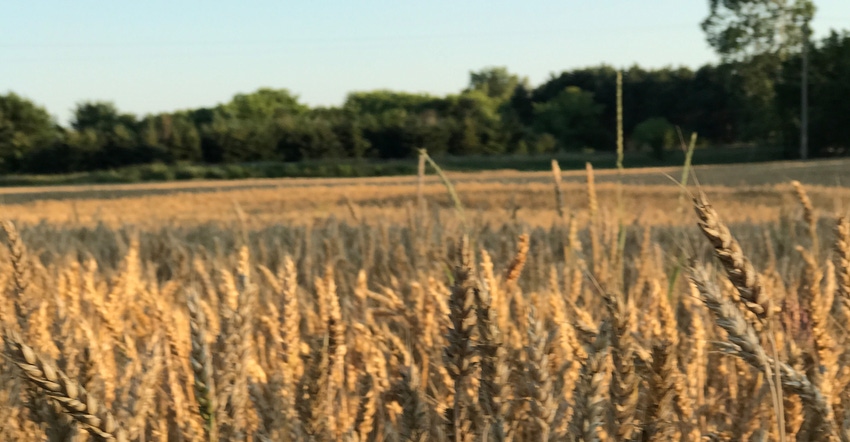August 26, 2019

When making planting decisions for this fall, growers may want to review the results of the high-management work funded by the Michigan Wheat Program.
For the seventh consecutive year, the Michigan Wheat Program has partnered with Michigan State University to have a high-management component as part of the MSU Wheat Performance Trials. Those trials have been harvested, and the results are hot off the press.
Farmers will want to study results of the 108 varieties tested in plots across Michigan before making seed purchasing decisions for planting in the fall, MSU wheat specialist Dennis Pennington says.
“We’d like to think that the Michigan Wheat Program’s focus on high-management research and Extension outreach, along with Michigan’s unique climate — and especially these high-management plot comparisons — are helping drive increased productivity and quality in the state even when faced with tough weather years,” says David Milligan, chairman of the nine-member Michigan Wheat Program board and a wheat farmer from Cass City.
Results from the 2018-19 research plots just harvested found that high management on average produced an 11.7-bushel-per-acre yield advantage, with some varieties responding with more than a 20-bushel-per-acre higher yield.
“Every wheat farmer in Michigan should be looking at farm management and how the various varieties respond to high management to make the decision as to what is the best variety for their farm,” Milligan says.
This year’s performance trials include 59 commercial wheat varieties and 49 experimental wheat seed lines. The seed lines were developed by 13 organizations and several seed companies.
“When selecting varieties, it’s important to look at multiyear data from locations that are closest to the soil type and conditions you have on your farm,” Pennington says. “Farmers should study individual varieties across all the parameters evaluated in the trials, including yield, test weight and disease ratings. This report is an unbiased, scientifically based evaluation of varieties in various Michigan regions.
“This data is meant to give Michigan farmers a leg up over their competition in other states. This report will be a valuable tool in helping farmers make decisions about which varieties to plant on their farms."
Wheat trial details
MSU’s wheat research team has planted wheat trial plots for more than 17 years. During the 2018-19 growing season, research plots were planted on an MSU research farm in Ingham County and on private farmland in five counties: Gratiot, Huron, Lenawee, Sanilac and Tuscola.
This year’s trials were planned to have two farms that had both conventional and high-management plots, to create a “same farm” comparison. These comparisons occurred in Gratiot and Tuscola counties. Unfortunately, the Gratiot conventional management comparison was lost because of spring rain damage.
Farms hosting the trials included:
Stuart Bierlein of Reese (Tuscola County)
Crumbaugh Legacy Farms of Ithaca (Gratiot County)
Darwin Sneller of Owendale (Huron County)
MSU Mason Research Farm (Ingham County)
Woods Seed Farm of Deerfield (Lenawee County)
JGDM Farms of Deckerville (Sanilac County)
High-management wheat plots included an additional 30 pounds of nitrogen per acre (28% nitrogen), as well as Quilt Excel fungicide at Feekes 9.0 (flag leaf) and Prosaro fungicide at the average flowering date in each location, Pennington says.
“At its meeting next week, the Michigan Wheat Program board will take a deeper dive into results of the 2019 Wheat Performance Trials, including high-management treatments, and will consider whether to continue this multiyear project for the 2019-20 season,” says Jody Pollok-Newsom, executive director of the Michigan Wheat Program.
“There is a wealth of knowledge in the report, and I know the board is very proud of playing this important role in advancing knowledge about high-management wheat production here,” Pollok-Newsom adds.
Results of the 2019 trials, as well as the previous six years of high-management data, are available at www.miwheat.org under the Research and High-Management tabs. The 2019 data also may be found on the home page under “What’s Hot.”
MSU researchers and the Michigan Wheat Program recommend reviewing at least three years of trial research when making decisions for your farm.
The Michigan Wheat Program is a checkoff organization funded by nearly 8,000 wheat farmers who grow wheat in 50 of Michigan’s 83 counties. Michigan wheat farmers plant 500,000 acres of red and white winter wheat annually, resulting in a crop of 40 million bushels on average. The state’s wheat crop has a total economic impact of about $388 million annually.
Source: Michigan Wheat Program, which is solely responsible for the information provided and is wholly owned by the source. Informa Business Media and all its subsidiaries are not responsible for any of the content contained in this information asset.
You May Also Like




